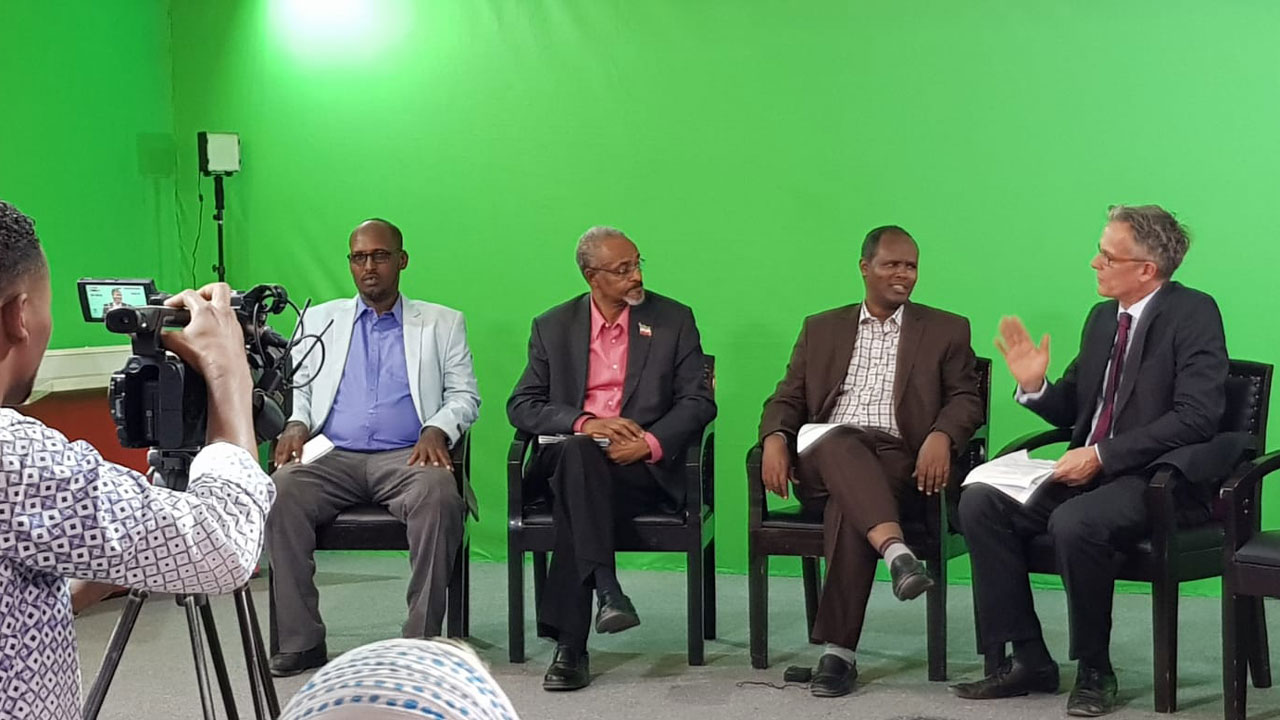
Our Somaliland Government Communications and Media programme marked a major milestone on July 21 when, with programme support, the University of Hargeisa opened a brand new training studio at its recently launched journalism faculty.
Team Leader Andy Hill and Project Director Barrie Way were at the launch at the faculty – the first journalism faculty of its kind in Somaliland – and have written up this blog about what this now means for Somaliland’s free press.
Somaliland is at a moment its history where there is real momentum in the media sector.
There is a strong desire on the part of government, media houses, individual journalists and the public, to communicate more about what the what the government is doing and planning, as well as hearing about issues of concern to ordinary Somalilanders, both in Hargeisa and in the regions.
The public want more than just the typical diet of rumour, speculation, political and clan news. They want interesting, fact-based reporting on a wide range of social and economic topics – and across a range of media, from TV and radio though to the print media and the proliferation of online platforms.
While the desire is there, the capability isn’t there yet. Media in Somaliland is widely accused of being driven by rumour and misinformation – often as a result of a dearth of official output and an inability to sustainably finance high quality journalism and investigative reporting. This risks exacerbating instability in Somaliland, and limits the key democratic function of the media to hold the government to account.
So that’s what we’re working on. With funding from the UK Government’s Conflict, Stability and Security Fund (CSSF), we’re working to increase the capacity of both the media and the Somaliland Government to disseminate accurate information and analysis to citizens in a timely and responsible manner.
Through training, mentoring and engagement with political leaders, civil society and media houses, Coffey is delivering a strategic communications programme to build trust between the state, media and the public. We’re doing this by helping the government to communicate proactively with the public through an increasingly professionalised, independent media in an environment where freedom of expression is respected. This is essential for democratic governance, accountability and stability.
Last week was an exciting one for the project. On 21 July, the UK Ambassador, David Concar, officially opened a training TV studio built at the University of Hargeisa under our Government Communications and Media Programme.
The studio was handed over to the university after it launched its first faculty of journalism, offering the profession consistent, long-term training. This is in response to frequent complaints by the government – and the media – that journalistic output is of poor quality as most journalists are self-taught or have had only minimal workshop coaching.
This is more than a studio – a very well-equipped studio: it is a symbol of freedom of expression and a pillar of democracy.
Project Manager, Saeed Hussein, and Team Leader, Andy Hill, worked with Somaliland Journalists’ Association (SOLJA) and Media Ink, a Somaliland-based media centre, to design, build and equip the studio in about four months. It has a newsroom platform and 24 raised seats so that students can learn techniques that might secure jobs in the fastest-growing sector of the media.
The launch was filmed by students using the new equipment, and was broadcast on national TV and radio, and by private media. Journalism students took the opportunity to interview the ambassador after the ceremony.
In addition to supporting the Presidency with strategic communications and the University of Hargeisa with training, our partner, International Media Support, is delivering business training and mentoring to Somaliland media houses, as well as working with them to improve standards of journalistic integrity and fresh ways of packaging content to reflect what the public is concerned about.
We hope that all this work on improved government-media engagement and professionalisation of the media sector will encourage the government to amend the existing press law into a comprehensive media law covering print broadcasting and online media. It is an exciting time to be here.
This is a joyful day. Journalism has known quite a lot of programmes in this country. But this is a breakthrough for the free press because they will now get the teaching they lack.

